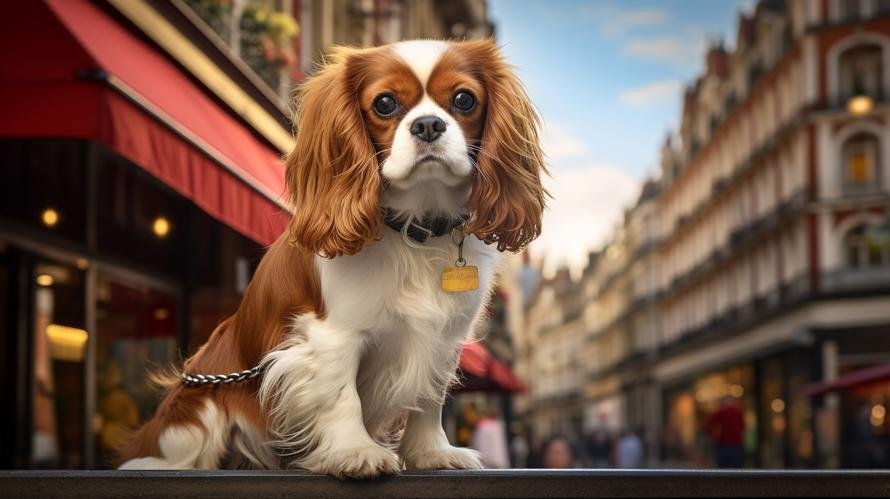Have you ever wondered what it would be like to have a furry best friend brushing against your legs like a tiny, four-legged shadow? Well, if you’re thinking about bringing a Cavalier King Charles Spaniel into your family’s lives – yay! You’ve made an adorable choice! However, wait right there! You may be wondering: “Does this endearing breed have an aggressive streak in them?”
There’s a general perception that dogs are aggressive — baring and gnashing their teeth, barking furiously, and lunging at people who dare come close. However, when it comes to the Cavalier King Charles Spaniel, something’s a little different. These dogs, descended from royals themselves, approach life with a distinctly un-aggressive and, in truth, congenial demeanor. That’s correct! Cavaliers are known for their friendly, gentle, calm, and downright cuddly disposition.
Cavalier King Charles Spaniels – or ‘Cavs’, as they’re fondly known among enthusiasts – are marked by their characteristic mellowness. Named after King Charles II of England, this breed comes with a lineage of companionship that dates back centuries. The breed, currently ranked 18th out of 155 breeds by the American Kennel Club (AKC) in terms of popularity, is known for its sweet nature and undying love for their human companions.
If you’re looking for a dog that matches their charm with an equal measure of non-aggressiveness, Cavs are practically the canine embodiment of the best of British manners. Unlike some breeds that are known for their propensity for guarding or hunting, Cavaliers are rarely aggressive. These dogs lack the guarding instincts of breeds like German Shepherds or the prey drive of breeds such as the Jack Russell Terrier. As a result, aggressive behavior is not something that comes naturally to them.
But wait! Before you rush to get that adorable Cavalier puppy, remember this – every dog is an individual. While the breed standard can give you some insights, it is not a sole determinant of your pup’s personality. Training, socialization, and a positive environment play a critical role in shaping a pup’s behavior as they grow.
When we think about aggression in dogs, we generally think about dogs lashing out at people or other animals. But there’s more to the term ‘aggressiveness’. Aggression can manifest in different forms such as barking at the mailman, chewing furniture, or even simple hyperactivity. But fear not! Most of this behavior can be attributed to their puppy phase. Like all pups, Cavaliers also go through a phase of teething, exploring, and learning about their environment.
However, these behaviors can be easily managed with proper training and socialization. It is important to start training your pup early, so they can learn proper behavior and manners. Besides training, socialization also helps mitigate any aggressive behavior. It is suggested to expose your Cavalier to different environments, people, and other animals to help grow their confidence and reduce any bouts of fearfulness that could trigger aggression.
It’s also important to notice signs of fear or anxiety in your Cavalier, as this can sometimes lead to aggression. If your pup suddenly starts showing signs of aggression, it might be worthwhile to consult a veterinary behaviorist.
Nutrition and health can sometimes influence a dog’s behavior too. Cavaliers are prone to certain health problems such as Mitral Valve Disease (MVD) and Syringomyelia (SM) that can affect their behavior. Again, this is where regular vet check-ups become crucial. A well-monitored diet and regular exercise also help in reducing any chances of aggression.
Now, some might say, “But my Cavalier growls when playing tug or while eating.” Worry not! This is considered normal dog behavior and often does not signify aggression. Your dog is merely communicating with you in one of the limited ways they can.
So, if we had to answer the question “Is a Cavalier King Charles Spaniel aggressive?”, the straightforward answer would be ‘no, not typically.’ Cavaliers have been specially bred for companionship, and they take that job very seriously. They thrive on love, cuddles, and gentle playtime. Their lively spirit and melodious bark can surely bring a chuckle to your day.
In ensuring that your Cavalier (and indeed, every dog!) grows to be well-behaved and non-aggressive, remember that your fluffy friend is a product of their experiences. Treat them with the love and respect that these royal descendants deserve. Provide them with a safe space, a healthy diet, and ample socialization opportunities that will help them grow into the loving, friendly, and warm dog that you desired in your lives. You’ll have a furry companion always eager for a cuddle, and who could resist that?



